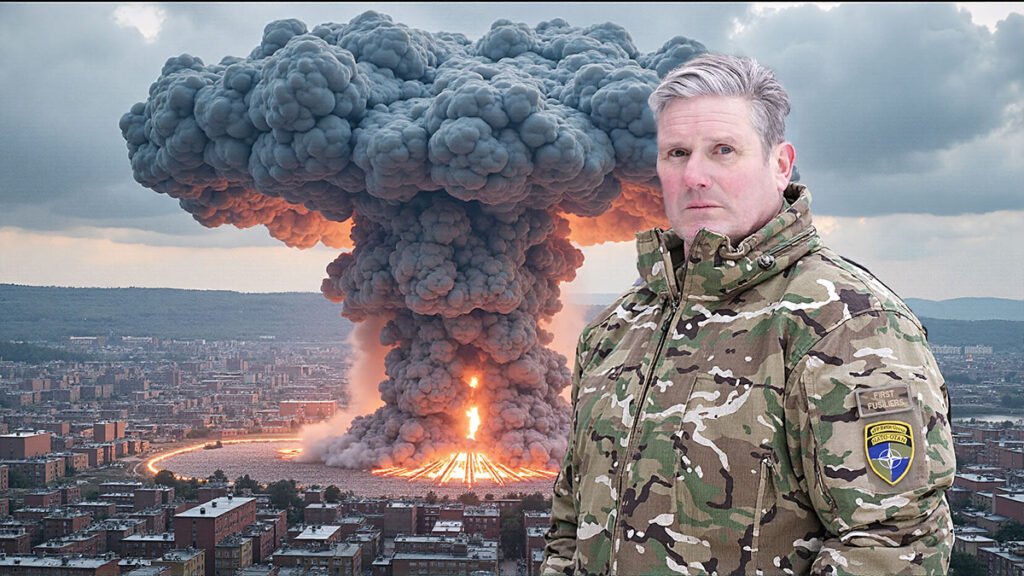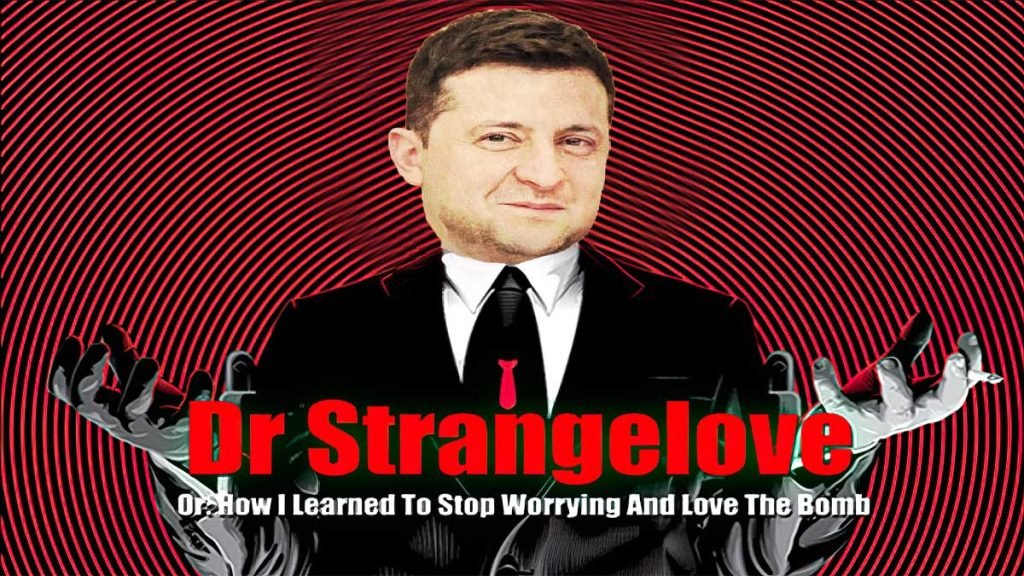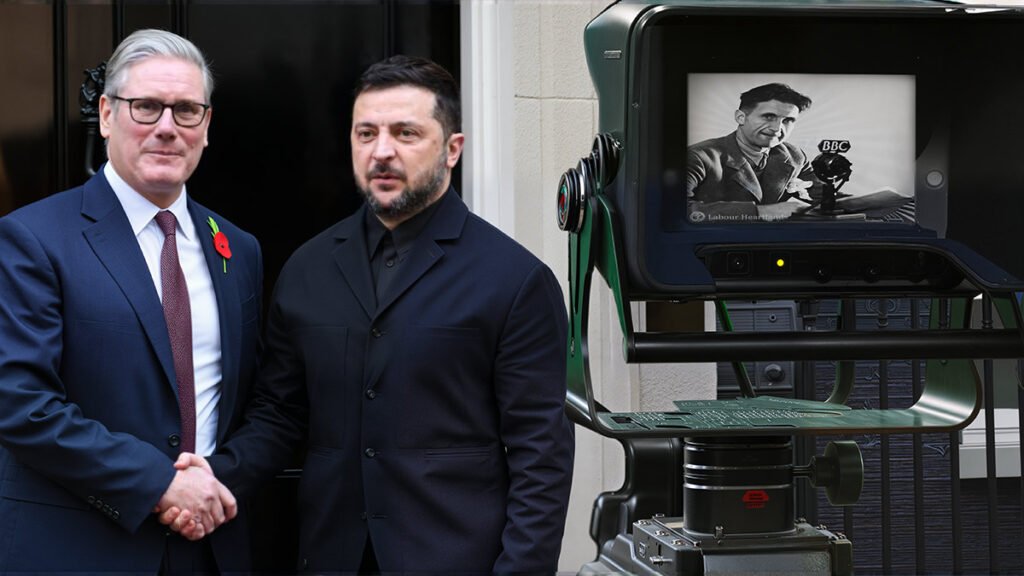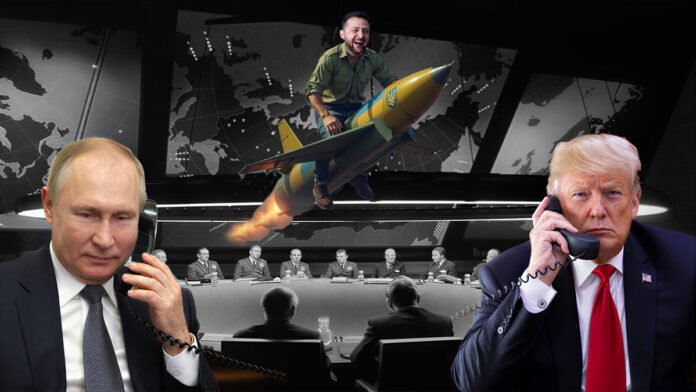Beyond Borders: The Tomahawk Dilemma – Britain’s Next Step Toward Escalation
While some see the provision of advanced weaponry to Ukraine as a necessary response to Russian aggression, others warn of the perilous road ahead. The warmongers who clamour for escalation downplay the potential consequences, failing to grasp the gravity of what is unfolding.
Now the debate has moved beyond Storm Shadow missiles, beyond air defence systems, beyond the incremental escalation we’ve been sleepwalking into for three years. Now we’re talking about Tomahawk cruise missiles. And if you don’t understand what that means, let me explain it in terms even the warmongers in Westminster might grasp: we are discussing giving Ukraine the capability to strike targets 1,600 kilometres inside Russia with weapons that can carry nuclear warheads.
Let that sink in for a moment. Not defensive weapons. Not systems to protect Ukrainian cities from bombardment. Long-range offensive missiles capable of hitting Moscow, St Petersburg, or any strategic target deep in Russian territory. Missiles that blur the line between conventional and nuclear warfare so thoroughly that the distinction becomes meaningless in the fog of conflict.
“Mr President, I’m not saying we wouldn’t get our hair mussed. But I do say no more than ten to twenty million killed, tops. Uh, depending on the breaks.” — General Buck Turgidson, Dr Strangelove
The Tomahawk, developed by the United States and long deployed by both the US and UK navies, is a subsonic, long-range, all-weather cruise missile capable of striking targets with pinpoint accuracy at ranges of up to 1,600 kilometres. It can be launched from ships or submarines. It carries a 450 kg conventional warhead. Or, in some variants, a nuclear payload.
Here’s the nightmare scenario the warmongers refuse to discuss: when a Tomahawk launches, Russian early warning systems detect it immediately. But here’s what they cannot detect, whether that missile carries a conventional warhead or a nuclear one. The radar signature is identical. The trajectory is the same. And Russian commanders have minutes, not hours, to decide whether this is the opening salvo of a nuclear first strike requiring immediate retaliation, or a conventional attack they can absorb.
Asking a Russian nuclear defence system to distinguish between a conventional and nuclear payload mid-flight isn’t just impossible. It’s the exact scenario that nearly ended the world multiple times during the Cold War. It’s why we developed protocols, hotlines, and verification systems designed to prevent the kind of ambiguity that could trigger accidental Armageddon. And now we’re casually discussing handing Ukraine weapons that recreate that exact nightmare, betting everything that in the fog of war, with minutes to decide, Russian commanders will guess correctly about whether they’re facing annihilation.
Unlike the Storm Shadow missiles Britain has already supplied to Ukraine (with a range of around 560 km), the Tomahawk represents a dramatic leap in reach and risk. Its deployment would enable strikes deep into Russian territory, hundreds of miles beyond the frontlines, making it, in every sense, a strategic weapon. The kind of weapon that changes the character of a conflict. The kind that makes adversaries recalculate their response options. The kind that, throughout the Cold War, we understood could trigger the cascade toward mutual annihilation.
Zelensky, frustrated by Washington’s refusal to provide Tomahawks, recently pointed out that “European countries also have Tomahawks.” That wasn’t a subtle hint. It was a direct appeal to London. And whilst the UK government has made no public commitment to supplying them, Prime Minister Keir Starmer has made abundantly clear his intention to “do more” and “go further” in arming Ukraine. Coupled with Rachel Reeves’ apparent willingness to fund an ever-expanding war budget whilst slashing domestic spending, the trajectory is obvious.
The debate is moving rapidly from “if” to “when.” Not whether Britain should cross this Rubicon, but how soon we can get the missiles delivered.
The risk is simple: every new missile extends the battlefield and shortens the path to catastrophe. As Vladimir Putin recently warned, “The consequences of using such a weapon against Russia would be serious, if not staggering.”
The irony of it all is that in another life, the young Keir Starmer advocated for dismantling NATO, for banning the bomb.

“Gentlemen, you can’t fight in here! This is the War Room!” — President Merkin Muffley, Dr Strangelove
I say this not as a pacifist, but as a former British soldier who served in the Army’s only nuclear missile regiment during the Cold War. I stood on bases where missiles capable of incinerating cities stood ready for launch. I lived through an era when the Soviet Union could summon the entire Warsaw Pact, including Ukraine, to its side. When tensions were measured in minutes and the world came closer to annihilation than most people realise.
And even then, even in that era of maximum brinkmanship, when every military leader understood that miscalculation meant species-level consequences, the hawks and generals alike grasped one unshakable truth: escalation meant annihilation. There were rules. Lines that could not be crossed. Weapons systems that, however effective militarily, were simply too dangerous to deploy because the risk of catastrophic misunderstanding outweighed any tactical advantage.
We understood, in that terrifying clarity that comes from staring at the abyss, that some capabilities must never be used not because they wouldn’t work, but because they would work too well. That some escalations cannot be walked back. That once you cross certain thresholds, the control you think you have evaporates in the heat and chaos of conflict.
That experience gives me a clear-eyed view of where this path leads. And I have no illusions about who profits from war. It isn’t the people. It isn’t Ukraine. It isn’t even Britain. It’s the arms manufacturers whose stock prices soar with every shipment. It’s the lobbyists who wine and dine MPs whilst children go hungry. It’s the consultants and contractors and political operators who get rich whilst working people pay the price.
Already, we’ve seen UK-supplied Storm Shadow missiles strike targets 200 kilometres inside Russia, hitting a chemical plant and crossing what used to be called red lines. Westminster barely blinked. The media reported it as progress. No debate in Parliament. No vote. No democratic accountability. Just another escalation in a war that creeps further into Russian territory with each passing month whilst we pretend it won’t have consequences.
Vladimir Putin, whatever you think of him, understands exactly what these weapons mean. His recent warning was not bluster for domestic consumption. It was a statement of strategic reality: “The consequences of using such a weapon against Russia would be serious, if not staggering.”
Translation: if you give Ukraine the capability to strike Moscow with weapons that are indistinguishable from nuclear delivery systems until they detonate, you fundamentally change the nature of this conflict. You move from a regional war with horrific but contained consequences to a confrontation between nuclear powers where miscalculation or misidentification could trigger responses that end civilisation.
Even Donald Trump, hardly a dove, warned that providing such missiles risks catastrophic escalation. When Trump is the voice of restraint, you know the situation has spiralled beyond reason.
But here’s the contradiction nobody in Westminster wants to address, the one that reveals this entire narrative as manufactured justification for endless escalation. If Russia is the existential threat to Europe that we’re constantly told it is, the peer military power that requires NATO expansion and endless weapons shipments to contain, then how has Ukraine, a nation relying entirely on borrowed money and second-hand equipment, not only survived but held Russia at bay for three years?
As Noam Chomsky observed, you cannot have it both ways. Either Russia is a paper tiger, a declining power whose military has been exposed as far weaker than advertised, in which case the justification for escalation collapses. Or Russia is an existential threat to European security, in which case how is Ukraine, outgunned and outmanned, still standing?
The answer, of course, is that neither narrative is quite true, and both are useful. Russia is neither the unstoppable juggernaut nor the collapsing failure. It’s a regional power fighting a grinding war it cannot easily win but also cannot afford to lose. But nuance doesn’t sell weapons. Nuance doesn’t justify £21.8 billion in military spending. Nuance doesn’t keep the tills ringing.
So we get contradiction instead. Russia is simultaneously so weak that we must press our advantage by arming Ukraine with ever-longer-range missiles, and so dangerous that any negotiated settlement would represent appeasement. The narrative shifts depending on which argument justifies more escalation at any given moment. And somehow, nobody in power notices or cares about the logical incoherence, because the incoherence serves the only purpose that matters: keeping the war going and the profits flowing.
But restraint isn’t profitable. Restraint doesn’t generate contracts for BAE Systems or Lockheed Martin. Restraint doesn’t justify £21.8 billion in spending whilst pensioners freeze and food banks run empty. Restraint doesn’t feed the beast that is the modern military-industrial complex, that sprawling network of manufacturers, lobbyists, think tanks, and compliant politicians who’ve turned endless war into a business model.
“The whole point of the doomsday machine is lost if you keep it a secret! Why didn’t you tell the world?” — President Merkin Muffley, Dr Strangelove
Here’s what nobody in Westminster wants to discuss: the insanity of what we’re doing. We’re funding a war that cannot be won militarily, that everyone privately admits will end in negotiation, whilst providing weapons that push that negotiation further away with each escalation. We’re treating nuclear brinkmanship as normal policy, as if we’ve learned nothing from history, as if the Cold War was just ancient history rather than a lesson in how close we came to destroying everything.
Rachel Reeves, who lectures working people about fiscal responsibility, who means-tested pensioners’ fuel payments whilst inflation ate their savings, who insists there’s no money for public services, somehow finds billions for missiles. Not just for defence. For offensive capabilities that extend the battlefield deeper into a nuclear power’s territory.
Let’s be clear about the priorities this reveals. When British children are living in poverty, when NHS waiting lists reach record lengths, when councils declare bankruptcy and schools operate on shoestring budgets, when working people can’t afford heating or housing, the government tells us there’s no money. Austerity, they say. Tough choices. Living within our means.
But for weapons? For escalation? For pushing humanity closer to nuclear exchange? The vault opens. The billions flow. And anyone who questions it gets accused of appeasing Putin or abandoning Ukraine or failing to understand the stakes.
I understand the stakes perfectly. That’s why I’m terrified by how casually we’re gambling with them.
The next round of London talks, according to reports, will focus on delivering even more long-range capabilities. Starmer is reportedly preparing to “push European allies to do more,” as if escalation were a moral duty rather than a road to catastrophe. Ukraine wants Germany’s Taurus missiles, which can strike nearly twice as far as Storm Shadow. Zelensky has made clear he wants Tomahawks. And Britain, ever eager to prove its relevance on the world stage, seems determined to oblige.

There’s been no public discussion about whether Britain should provide these weapons. No parliamentary debate about the strategic implications. No vote on whether expanding Ukraine’s strike capability into the heart of Russia serves British interests or merely arms manufacturers’ profits. Just quiet meetings, careful briefings, and the steady march toward a decision that could reshape European security or end it entirely.
Since when has democratic consent ever stood in the way of a war economy on the rise? Since when have the people whose lives are at stake been consulted about whether they want to risk nuclear exchange to support a conflict that, however justified Ukraine’s cause, shows no sign of resolution through military means?
“You’re talking about mass murder, not war!” — President Merkin Muffley, Dr Strangelove
The absurdity would be hilarious if the consequences weren’t so grave. We’re watching a replay of Cold War madness, but this time the generals and politicians seem to have forgotten why those weapons were never used. They’ve forgotten that deterrence only works when everyone believes you’re rational enough not to use them. They’ve forgotten that escalation has its own logic, its own momentum, that once started is almost impossible to stop.
They’ve forgotten, or perhaps never learned, that in nuclear conflict there are no winners. Only degrees of loss. That “ten to twenty million killed, tops, depending on the breaks” isn’t an acceptable casualty estimate. It’s genocide. It’s the end of everything we claim to be defending.
But memory is short in Westminster. And profit is long. Every time Zelensky lands in London, the tills of the military-industrial complex start ringing. Defence contractors brief ministers. Lobbyists work their contacts. Think tanks funded by arms manufacturers publish papers about the necessity of doing more. And somehow, miraculously, the money materialises. Not for the NHS. Not for schools. Not for the infrastructure falling apart beneath our feet. For missiles.

The warmongers who clamour for escalation downplay the potential consequences. They speak in abstractions about “degrading Russian capability” and “supporting our allies” and “defending democracy.” They don’t speak about radiation sickness. About nuclear winter. About civilisational collapse. About cities turned to ash. About the fact that if this goes wrong, if miscalculation or accident or madness triggers the exchange we’re courting, there won’t be anyone left to judge whether it was worth it.
I’ve stood in rooms where these weapons were kept. I’ve trained with people who would have launched them on command. I’ve lived with the knowledge of what they do, not in abstract terms but in specific, horrifying detail. And I’m telling you: we are sleepwalking toward catastrophe whilst pretending it’s policy.
If there is ever a Third World War, and if humanity survives it, the next war will indeed be fought with sticks and stones. Einstein’s famous prediction wasn’t metaphor. It was physics. And the victors won’t be the nations with the best weapons or the most resolve or the righteousness of their cause. The victors will be the vultures, circling over the ruins of what we were.
“Of course, the whole point of a Doomsday Machine is lost, if you keep it a secret! Why didn’t you tell the world, eh?” — Dr Strangelove
Support Independent Journalism Today
Our unwavering dedication is to provide you with unbiased news, diverse perspectives, and insightful opinions. We're on a mission to ensure that those in positions of power are held accountable for their actions, but we can't do it alone. Labour Heartlands is primarily funded by me, Paul Knaggs, and by the generous contributions of readers like you. Your donations keep us going and help us uphold the principles of independent journalism. Join us in our quest for truth, transparency, and accountability – donate today and be a part of our mission!
Like everyone else, we're facing challenges, and we need your help to stay online and continue providing crucial journalism. Every contribution, no matter how small, goes a long way in helping us thrive. By becoming one of our donors, you become a vital part of our mission to uncover the truth and uphold the values of democracy.
While we maintain our independence from political affiliations, we stand united against corruption, injustice, and the erosion of free speech, truth, and democracy. We believe in the power of accurate information in a democracy, and we consider facts non-negotiable.
Your support, no matter the amount, can make a significant impact. Together, we can make a difference and continue our journey toward a more informed and just society.
Thank you for supporting Labour Heartlands









